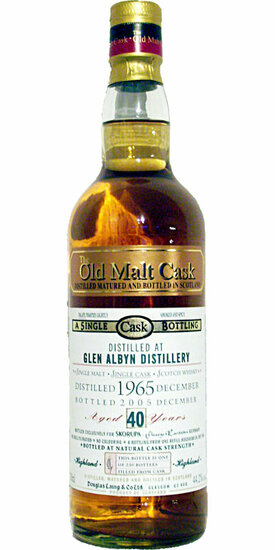When is Glen Albyn closed
Glen Albyn, a name once known as a producer of excellent Scotch whisky, is now just a reminder of a glorious past. Located in Inverness, in the heart of the Highlands, this distillery was founded in 1844. For decades, Glen Albyn was known for its distinctive and high-quality whiskys that seduced enthusiasts around the world. However, as is the case with many distilleries, their production period came to an end.
In 1983 the curtain fell for Glen Albyn. After almost a century and a half of artisanal craftsmanship and traditional production, the distillery was finally closed. The abrupt end of Glen Albyn created a sense of loss among whisky fanatics and connoisseurs worldwide. Although the distillery is no longer operational, the memories of their exceptional whiskys continue to live on in collectors' collections and in the history of Scotch whisky.
Most popular bottle from Glen Albyn
Despite its untimely closure, Glen Albyn has left a lasting legacy, thanks largely to some of its most iconic bottles. One of Glen Albyn's most popular expressions was the 15-year-old single malt, which was known for its complex flavor profile and refined aromas. With notes of honey, vanilla and subtle hints of fruit, this whisky offered an unforgettable drinking experience for connoisseurs and novices alike.
Another critically acclaimed bottle from the Glen Albyn collection was the 20 year old bottling, loved for its deep, rich flavor and silky texture. With a perfect balance of sweetness and spiciness, this whisky quickly gained a reputation as one of the most sought-after Scottish single malts on the market. The rarity of these bottles, together with their impeccable quality, makes them true treasures for whisky collectors everywhere.
Although the distillery is no longer active, these bottles remain a tangible reminder of Glen Albyn's glory years and remind enthusiasts of the unique craftsmanship and dedication that once went into the production of their whiskies.
Why is Glen Albyn closed
The closure of Glen Albyn was not an isolated incident in the history of Scotch whisky. The fate of Glen Albyn reflects the challenges that many distilleries faced in the late 20th century. Economic factors, changes in consumer preferences and industry consolidation all played a role in the demise of this venerable distillery.
One of the main reasons behind the closure of Glen Albyn was the declining demand for whisky in the 1980s. This period was marked by a shift in the drinks market, with consumers increasingly preferring other alcoholic drinks such as wine and vodka. The declining demand for whisky led to overproduction and oversupply in the market, forcing many distilleries to close their doors.
In addition, economic factors also played a role in the demise of Glen Albyn. High operating costs and declining profit margins made it difficult for the distillery to remain profitable in an increasingly competitive market. Despite efforts to optimize production and reduce costs, Glen Albyn continued to struggle to stay afloat.
Finally, industrial consolidation and restructuring contributed to Glen Albyn's demise. At a time when major drinks groups were pursuing mergers and acquisitions to strengthen their market position, smaller, independent distilleries such as Glen Albyn often fell victim to these consolidation trends. As a result, many traditional distilleries were forced to close their doors or were taken over by larger players in the industry.
All in all, the closure of Glen Albyn was the sad result of a complex interplay of economic, industrial and social factors. Although the distillery is no longer active, Glen Albyn's legacy continues to live on in the hearts and minds of whisky fanatics around the world, as a reminder of an era of artisan craftsmanship and traditional whisky production.
Read more about
North Port here














